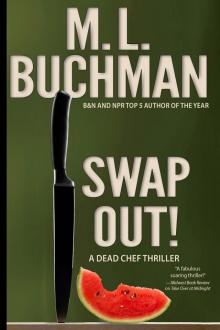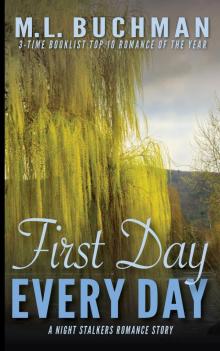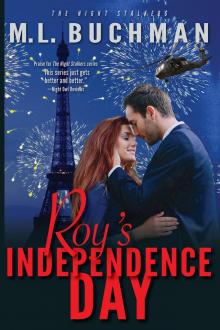 White Top
White Top Thunderbolt
Thunderbolt Storm's Gift
Storm's Gift The Complete Delta Force Shooters
The Complete Delta Force Shooters At the Quietest Word (Shadowforce: Psi Book 2)
At the Quietest Word (Shadowforce: Psi Book 2) At the Slightest Sound
At the Slightest Sound Dilya's Christmas Challenge
Dilya's Christmas Challenge Raider
Raider Havoc
Havoc Carrying the Heart's Load
Carrying the Heart's Load Flying Beyond the Bar
Flying Beyond the Bar Firelights of Christmas
Firelights of Christmas Where Dreams Are Well Done
Where Dreams Are Well Done Nathan's Big Sky
Nathan's Big Sky Heart of a Russian Bear Dog
Heart of a Russian Bear Dog Drone: an NTSB / military technothriller (Miranda Chase Book 1)
Drone: an NTSB / military technothriller (Miranda Chase Book 1) Flower of Destiny
Flower of Destiny Drone
Drone Ghostrider: an NTSB-military technothriller (Miranda Chase Book 4)
Ghostrider: an NTSB-military technothriller (Miranda Chase Book 4) Wild Fire
Wild Fire Team Black Sheep
Team Black Sheep The Complete Delta Force Warriors
The Complete Delta Force Warriors At the Quietest Word
At the Quietest Word At the Merest Glance
At the Merest Glance Havoc: a political technothriller (Miranda Chase Book 7)
Havoc: a political technothriller (Miranda Chase Book 7) White Top: a political technothriller (Miranda Chase Book 8)
White Top: a political technothriller (Miranda Chase Book 8) Between Shadow and Soul
Between Shadow and Soul Island Christmas
Island Christmas Survive Until the Final Scene
Survive Until the Final Scene Midnight Trust
Midnight Trust Return to Eagle Cove
Return to Eagle Cove Where Dreams Reside
Where Dreams Reside Honor Flight
Honor Flight Where Dreams Are Sewn
Where Dreams Are Sewn The Complete Hotshots
The Complete Hotshots Condor
Condor I Own the Dawn
I Own the Dawn Chinook
Chinook At the Merest Glance: a military paranormal romance (Shadowforce: Psi Book 3)
At the Merest Glance: a military paranormal romance (Shadowforce: Psi Book 3) Since the First Day
Since the First Day Thunderbolt: an NTSB / military technothriller (Miranda Chase Book 2)
Thunderbolt: an NTSB / military technothriller (Miranda Chase Book 2) For Her Dark Eyes Only
For Her Dark Eyes Only Play the Right Cards
Play the Right Cards Lost Love Found in Eagle Cove
Lost Love Found in Eagle Cove Big Sky Ever After: a Montana Romance Duet
Big Sky Ever After: a Montana Romance Duet Keepsake for Eagle Cove
Keepsake for Eagle Cove At the Clearest Sensation
At the Clearest Sensation The Ides of Matt 2015
The Ides of Matt 2015 When They Just Know
When They Just Know Cave Rescue Courtship
Cave Rescue Courtship Wildfire at Dawn
Wildfire at Dawn Dawn Flight
Dawn Flight Blaze Atop Swallow Hill Lookout
Blaze Atop Swallow Hill Lookout The Sword of Io
The Sword of Io Christmas at Steel Beach
Christmas at Steel Beach Heart's Refuge
Heart's Refuge By Break of Day (The Night Stalkers)
By Break of Day (The Night Stalkers) Kee's Wedding
Kee's Wedding Just Shy of a Dream
Just Shy of a Dream Path of Love
Path of Love Ghost of Willow's Past
Ghost of Willow's Past Flash of Fire
Flash of Fire Target of the Heart
Target of the Heart Sound of Her Warrior Heart
Sound of Her Warrior Heart Target of Mine: The Night Stalkers 5E (Titan World Book 2)
Target of Mine: The Night Stalkers 5E (Titan World Book 2) The Complete Where Dreams
The Complete Where Dreams Target of One's Own
Target of One's Own For All Their Days
For All Their Days Pure Heat
Pure Heat Love's Second Chance
Love's Second Chance Target Engaged
Target Engaged Bring On the Dusk
Bring On the Dusk Wait Until Dark (The Night Stalkers)
Wait Until Dark (The Night Stalkers) Big Sky, Loyal Heart
Big Sky, Loyal Heart Welcome at Henderson's Ranch
Welcome at Henderson's Ranch Damien's Christmas
Damien's Christmas Flight to Fight
Flight to Fight Nara
Nara Looking for the Fire
Looking for the Fire Love Behind the Lines
Love Behind the Lines Peter's Christmas
Peter's Christmas In the Weeds
In the Weeds Christmas at Henderson's Ranch
Christmas at Henderson's Ranch They'd Most Certainly Be Flying
They'd Most Certainly Be Flying Fire at Gray Wolf Lookout (Firehawks Book 8)
Fire at Gray Wolf Lookout (Firehawks Book 8) Wildfire on the Skagit (Firehawks Book 9)
Wildfire on the Skagit (Firehawks Book 9) A Hotshot Christmas
A Hotshot Christmas Off the Leash
Off the Leash Where Dreams Books 1-3
Where Dreams Books 1-3 Guardian of the Heart
Guardian of the Heart The Ides of Matt 2017
The Ides of Matt 2017 Where Dreams Unfold
Where Dreams Unfold Twice the Heat
Twice the Heat Wild Justice (Delta Force Book 3)
Wild Justice (Delta Force Book 3) Flying Over the Waves
Flying Over the Waves Love in the Drop Zone
Love in the Drop Zone I Own the Dawn: The Night Stalkers
I Own the Dawn: The Night Stalkers What the Heart Holds Safe (Delta Force Book 4)
What the Heart Holds Safe (Delta Force Book 4) The Christmas Lights Objective
The Christmas Lights Objective Road to the Fire's Heart
Road to the Fire's Heart Night Rescue
Night Rescue Delta Mission: Operation Rudolph
Delta Mission: Operation Rudolph Full Blaze
Full Blaze Night Is Mine
Night Is Mine Lightning Strike to the Heart
Lightning Strike to the Heart Beale's Hawk Down
Beale's Hawk Down Circle 'Round
Circle 'Round Cookbook from Hell Reheated
Cookbook from Hell Reheated Zachary's Christmas
Zachary's Christmas Reaching Out at Henderson's Ranch
Reaching Out at Henderson's Ranch Fire Light Fire Bright
Fire Light Fire Bright The Ides of Matt 2016
The Ides of Matt 2016 Her Heart and the Friend Command
Her Heart and the Friend Command On Your Mark
On Your Mark Swap Out!
Swap Out! Heart of the Cotswolds: England
Heart of the Cotswolds: England The Phoenix Agency_The Sum Is Greater
The Phoenix Agency_The Sum Is Greater Wildfire at Larch Creek
Wildfire at Larch Creek Target Lock On Love
Target Lock On Love Second Chance Rescue
Second Chance Rescue Where Dreams Are Written
Where Dreams Are Written First Day, Every Day
First Day, Every Day Christmas at Peleliu Cove
Christmas at Peleliu Cove Heart Strike
Heart Strike Man the Guns, My Mate
Man the Guns, My Mate Emily's Wedding
Emily's Wedding Daniel's Christmas
Daniel's Christmas Frank's Independence Day
Frank's Independence Day The Phoenix Agency: The Sum Is Greater (Kindle Worlds Novella)
The Phoenix Agency: The Sum Is Greater (Kindle Worlds Novella) Roy's Independence Day
Roy's Independence Day